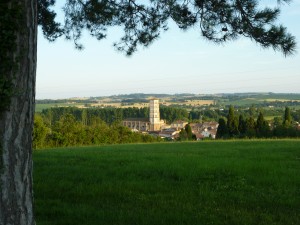in the failing light. Tonight, to celebrate completing the first draft of a short story, I went for dinner at the only restaurant in town, in the only hotel in town. By the time I left, the back patio was full: two couples, a family of five, four friends, an older man who’d been there when I arrived. We had the same set menu (the “Majanâ€), with the same entrée, but his pavé de boeuf was rarer than mine, and afterward, he went for caramel rather than pistachio ice cream. He sat there, shirt open halfway down his chest, smoking a brown cigarette down to the butt and tapping it, from time to time, into the only ashtray at any of the tables. I couldn’t smell it or the pool chlorine from where I sat, nearby, facing the patio stairs with a view down the long hall of the lobby through the front door open to the street. I watched all the diners wander in; if the hotel had guests tonight, they were eating elsewhere. Once in a very rare while, a truck thundered by. In the corner of the patio was a old-fashioned streetlamp, a bit taller than a coat rack, that never went on. Sometimes, from a speaker in the bushes where a black stray was on the prowl, came a song I knew: “Forever Young,” “Je t’aime (moi non plus),” “Downtown.” The only waiter was young and scrawny, his right arm sheathed in a tribal tattoo; partway through dinner his shirttail came untucked and stayed that way. On the bill, I saw his name was Benjamin.
In honor of my set menu, I hiked up to the chapel of the town’s patron saint. On the way, you pass something like a brick chimney, topped by a Madonna, marking the spring, now dry, where St. Majan is said to have vanquished a dragon by throwing his ring in its mouth. From atop the hill, you get a nice view of town, the development across the river, and the rolling hills around (taken before my two-month-old camera died. Damn you, Panasonic!).
The chapel is flanked by pines but has been locked against vandals. On a near rise are the remains of a long, low farmhouse: the fractured roof timbers, the whole near wall of unbaked earth still in one piece, but reeling as though from a mighty blow. A great part of the charm of age is crookedness, I think. Somehow, in America, decrepitude bespeaks only neglect, or the cheap residue of expedience, but here roofs sag beneath the weight of centuries and seem canny survivors.
Lombez is the kind of town where at nine on a Saturday night you can walk down the middle of the main drag because there’s no traffic. At one end is what used to be a hotel where a passenger and mail coach changed horse teams. Residents of the various apartments have decked with flora the cobblestone courtyard, which now seems inviting as a tropical oasis. In a faded stencil font over someone’s door it says: Lime Depot. The river Save is much lower than it was, after a week of blistering heat. You can sit on the edge of the bridge and see where, thronged by green, a single Calla lily seems to mark a virgin spring, or the spot where a saint’s blood was spilled. A little farther on is a green rowboat, picturesquely moored beneath a willow.
